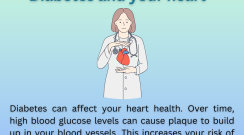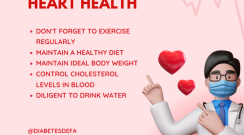Diabetes and heart health are closely linked, as diabetes increases the risk of developing heart disease. High blood glucose levels can damage blood vessels and nerves that control the heart, leading to complications such as coronary artery disease, heart attack, and stroke. Managing diabetes effectively by controlling blood glucose levels, blood pressure, and cholesterol is essential for maintaining a healthy heart. Adopting heart-healthy lifestyle habits such as eating a balanced diet, engaging in regular physical activity, maintaining a healthy weight, and avoiding smoking can also reduce the risk of heart disease in diabetes patients. Regular check-ups with healthcare providers to monitor heart health and manage risk factors are important for preventing heart complications. Overall, managing diabetes and maintaining a healthy lifestyle are key for promoting heart health and reducing the risk of heart disease.
- Posted: 01 June 2023
Managing diabetes and maintaining heart health require a holistic approach involving lifestyle modifications, medication management, and regular monitoring. By effectively managing diabetes and minimizing cardiovascular risk factors, you can reduce the risk of heart complications and promote a healthy heart.
- Posted: 17 March 2024
Explore methods to boost the health of your heart.
- Posted: 17 March 2024
Learn about the signs of a stroke. Diabetes is a significant risk factor for stroke. Proper management of diabetes through medication, lifestyle changes, and regular medical check-ups is crucial in reducing the risk of stroke.
- Posted: 17 March 2024
For diabetes patients, stroke prevention involves diligent management of blood glucose levels, regular exercise to promote cardiovascular health, adopting a balanced diet low in saturated fats and refined sugars, controlling blood pressure and cholesterol levels, and avoiding smoking and excessive alcohol consumption. Regular monitoring and proactive management of diabetes-related health parameters are also crucial in reducing the risk of stroke.
- Posted: 17 March 2024
For diabetes patients, maintaining heart health involves regular physical activity, adherence to a heart-healthy diet rich in fruits, vegetables, and lean proteins, monitoring and controlling blood glucose levels, managing blood pressure and cholesterol, avoiding tobacco use, and seeking regular medical check-ups to assess cardiovascular health and address any concerns promptly.
- Posted: 17 March 2024
FAST stands for Face drooping, Arm weakness, Speech difficulty, and Time to call emergency services. These are crucial warning signs of a stroke that require immediate attention and medical intervention.
- Posted: 17 March 2024
Regular exercise plays a key role in preventing high cholesterol levels by promoting better circulation, reducing LDL (bad) cholesterol, and boosting HDL (good) cholesterol.
- Posted: 17 March 2024
Walking for just 30 minutes a day can yield numerous health benefits, including lower blood glucose, improved cardiovascular health, strengthened muscles and bones, and better weight management.
- Posted: 17 March 2024
Here are six essential tips to safeguard your heart health.
- Posted: 17 March 2024
Explore various strategies to prevent cardiovascular disease (CVD), including adopting a heart-healthy diet, staying physically active, managing stress, avoiding tobacco, controlling blood pressure and cholesterol levels, and maintaining a healthy weight.











